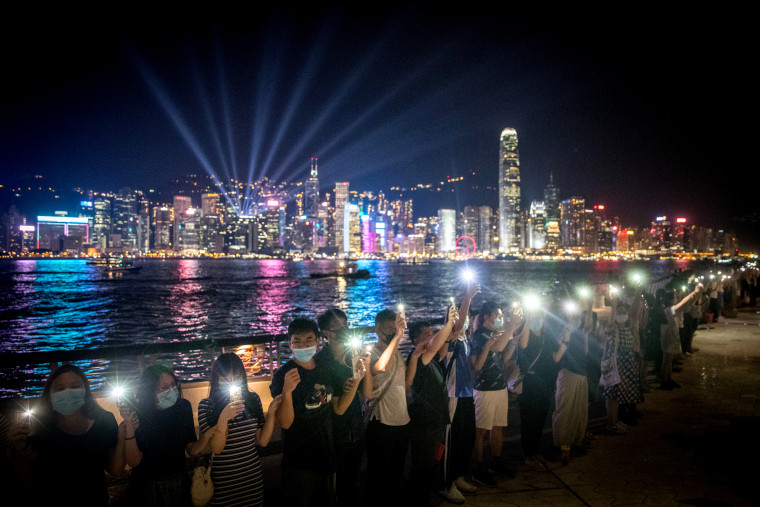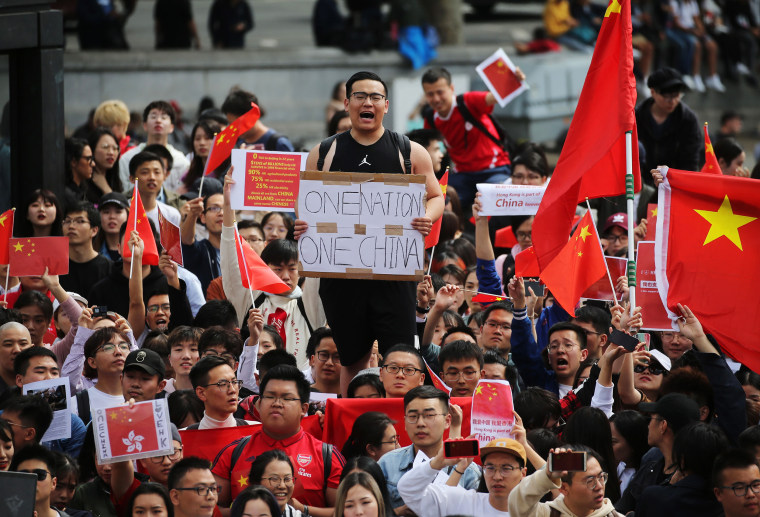As mass protests in Hong Kong rage on, some of the harshest criticisms of the protestors have come from their Chinese compatriots.
Hong Kongers are marching for autonomy from Chinese Communist rule and for democracy, but citizens of mainland China, who are supposed to be the ultimate beneficiaries of broader democratization in their country, have trashed the protestors as selfish, spoiled and unpatriotic. Among Chinese citizens who are well educated and well traveled, nationalism runs at a fever pitch.
I was once a Chinese nationalist with similar proclivities. Hong Kong — with its rule of law, vibrant free press, and freedom of association and assembly — changed my mind.
It was 1999, two years after Hong Kong’s reversion from British to Chinese sovereignty. I had moved to the “Pearl of the Orient” from New York City but did not actually want to be there. I was a recent college graduate and wanted to be where the action was. For me, that was mainland China, where historic economic and political transformations were in full swing. By contrast, Hong Kong was a city undergoing an identity crisis: It was no longer a British colony, but it was desperately trying not to be just another Chinese city.
Hong Kongers are marching for autonomy from Chinese Communist rule and for democracy, but citizens of mainland China have trashed the protestors as selfish.
Having emigrated from China to the United States at age 10, I was a proud U.S. citizen. But my Chinese nationalism ran deep. A couple of years before moving to Hong Kong, I had written an op-ed for The Los Angeles Times titled, “We Ask, ‘Can One Eat Liberty?’” Much of China barely had enough to eat, I argued. As such, the constant China bashing among American pundits, politicians and celebrities about China’s human rights abuses was “repugnant and counterproductive” and also a sign of ignorance of China’s impressive, hard-earned economic progress.
The Chinese government should have been impressed.
In Hong Kong, I was angry at many locals who had become accustomed to looking down their noses at mainlanders because the city’s prosperity under British rule had far outpaced the mainland’s economic backwardness under Communism. Some Hong Kongers even loudly objected to Chinese rule. None of it jibed with my Chinese nationalism. I was proud that Chinese metropolises like Beijing and Shanghai were quickly becoming economic powerhouses in their own right and, in some cases, threatening to overtake Hong Kong in dynamism.
Want more articles like this? Sign up for the THINK newsletter to get updates on the week's most important political analysis
Meanwhile, Hong Kong appeared devoid of grandeur and a sense of history. Major Chinese cities had a plethora of museums, concert halls and monuments. Hong Kong had huge crowds, shopping malls, mediocre museums and an endless obsession with its pop culture celebrities. Hong Kong’s news programs felt trivial, seeming to reflect the smallness of the city’s outlook and potential. By contrast, every trip I took to China offered glimpses of Chinese citizens dreaming big, taking risks, creating a better life, and building a stronger, better country.

My colleagues were polite and kind, and we communicated seamlessly in Cantonese, the local dialect and my native tongue. Yet I longed to hear the sound of Mandarin, China’s official language. Finally, about half a year into my residency in Hong Kong, I decided to leave. But as I prepared to say goodbye, I was jolted by a huge surprise: I had begun to miss the city I thought I disliked intensely.
The largest newspaper in the city was a tabloid, but it also ran some of the most trenchant editorials on the future of Hong Kong and Chinese politics. News programs might have been less than grand, but amid all the noise was real talk about real issues that affected the lives and livelihood of real people — millions of them — in the city.
Hong Kongers might have appeared materialistic; yet, each year, large crowds gathered to commemorate pro-democracy protestors who were slaughtered by the Chinese government in the Tiananmen Massacre of 1989. It is the only place in the People’s Republic of China where such a commemoration could take place.
As for my friends and colleagues, Cantonese gave me a window into their daily lives. On all those occasions when I wished I could have run to China to witness its transformation, to hear Mandarin being spoken, my friends from Hong Kong offered their sincerity and good humor. In the process, they taught me about their city’s dreams and aspirations, responsibilities and achievements.
In those last moments before I left Hong Kong as a resident, I realized that amid all the chaos, the tabloids, the materialism, there was friendship and loyalty, compassion and warmth, vibrancy and fiery debate. I realized I had changed my mind. I had fallen in love with Hong Kong.
After that, I could no longer go back to being a Chinese nationalist.
Hong Kong has long nourished the seeds of spontaneity that an authoritarian government cannot control. In many ways, the city’s current summer of discontent has been a reaction to the erosion under Beijing’s rule of qualities — like the free press — that make Hong Kong different from the rest of China.
Alas, there is no quick political solution in sight.
Mainland Chinese citizens who have vehemently denounced Hong Kong’s pro-democracy protests in recent months may never fall in love with Hong Kong; they may never change their minds.
Nevertheless, in the images of millions upon millions of Hong Kongers marching peacefully for a better future, I see the Hong Kong I fell in love with. I hope one day, the citizens of the mainland will, too.

